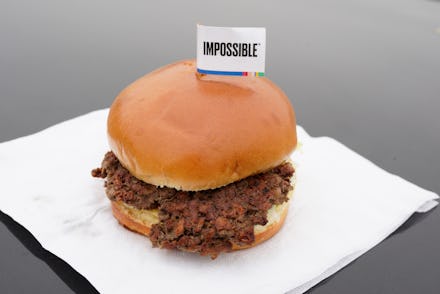You could see the Impossible Burger in grocery stores starting next month

If you have yet to try out the Impossible Burger, you're about to have a whole lot of chances to change that. The plant-based patty finally received approval from the United States Food and Drug Administration (FDA) to be sold directly to consumers. And Burger King also announced that it will be bringing the Impossible Whopper to its chain of restaurants nationwide in the coming week.
The biggest win of the day for Impossible Foods, the company behind the popular alternative-meat burger, is landing the FDA's seal of approval. With that under its belt, Impossible Foods can start putting the Impossible Burger in grocery stores instead of only selling directly to restaurants and fast food companies that would sell the patties cooked and ready to eat.
Causing the hold up on approval was Impossible Foods' use of a color additive called soy leghemoglobin that was previously not considered to be safe. Soy leghemoglobin, sometimes called heme, is a protein found in plants and, according to Impossible Foods, is the key to giving its plant-based burger patties a meaty flavor. Impossible Foods uses a yeast engineered with the gene for soy leghemoglobin in order to create its burgers, which it claims results in the "lowest achievable environmental impact." The company also put its heme through a rat feeding study that found no adverse effects on the animals, even at extremely high consumption levels. As Impossible Foods has noted, heme has been consumed by humans and animals for hundreds of thousands of years, it's just producing it in a new way.
Following testing and a formal petition from Impossible Foods filed nearly one year ago, the FDA is finally giving the go-ahead to sell raw foods with soy leghemoglobin to people. “Should no objections be raised, the direct-to-consumer sale of uncooked, red-colored ground beef analogue products containing soy leghemoglobin will be allowed,” the FDA said in a statement. The change will officially go into effect on September 4, meaning boxes of Impossible Burger patties could be in the freezer section of your grocery store as soon as next month.
If cooking up an Impossible Burger is too intimidating for you, though, then have no worries: you'll be able to snag a cooked up patty in the form of an Impossible Whopper from Burger King. After a test run in several markets, the burger chain is doing a nationwide roll-out of its famous Whopper burger with a plant-based patty in place of the standard meat. The Impossible Whopper will be available starting August 8 at Burger King's more than 7,200 locations across the United States. While the chain says the burger will only be available for a "limited time," the success of the plant-based patty in previous test runs suggests it'll probably stick around. A report from inMarket found that Burger King locations with the Impossible Whopper saw significantly more traffic than the company's national average.
Both events mark a significant step not just for Impossible Foods but for plant-based meat alternatives in general. Prior to the recent FDA ruling, the only realistic meat-like substitute in grocery stores was Impossible Foods' biggest competitor, Beyond Meats. Now consumers will have a choice while browsing the freezer section for a real meat substitute that is unlike the standard veggie burgers that came before. The development should open up the possibility of new competitors entering the space.
There are all sorts of reasons to consider adding a plant-based alternative into your meal rotation, even if you don't replace meat entirely. There are some cancer risks associated with large amounts of consumption of red meat, and it also helps avoid some of the potential exposure to growth hormones and antibiotics typically fed to cows. Ditching meat also means helping to cut back on the amount of carbon emissions coming from livestock. According to the New York Times, as much as 18 percent of all human-induced greenhouse gas production comes from livestock. An analysis of the Impossible Burger's production found that the carbon footprint of the plant-based patty is 89 percent smaller than that of a burger coming from a cow. And of course, if none of those reasons are compelling enough to give meat alternatives a try, there's the simple appeal mixing it up a bit when it comes to your meals. Variety is the spice of life, after all.